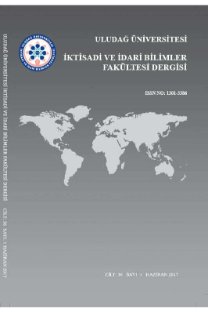Türkiye'de maliye politikası konjonktür yanlısı mı?
Bu çalışmada 1998:1-2012:3 döneminde Türkiyede maliye politikasının konjonktürelliği literatürde yaygın olarak kullanılan iki yöntemle incelenmektedir. Basit formdaki regresyonlara göre reel toplam hükümet harcamaları ve reel faiz dışı hükümet harcamaları konjonktür karşıtı görünse de ilgili katsayıların istatistiksel olarak anlamlı değildir. Üretim açığı, borç stoku ve bağımlı değişkenin bir gecikmeli değerine bağımsız değişken olarak yer verilen regresyon analizi bulgularına göre birincil fazlanın konjonktür karşıtı, hükümet gelirlerinin ise konjonktür yanlısı olduğu anlaşılmaktadır. Borç stokuyla ilgili katsayının, bağımlı değişken olarak birincil fazla kullanıldığında istatiksel açıdan anlamlı olduğu bulunmuştur. Ayrıca, maliye politikasında ataletin önemli olduğu sonucuna varılmıştır
Is fiscal policy procyclical in Turkey?
This study examines the cyclicality of fiscal policy in Turkey over the period 1998:1-2012:3 by using two empirical methods which are frequently employed in the literature. A simple regression shows that reel total government expenditures and total government expenditures minus interest payments seem countercyclical but the coefficients are not statistically significant. When output gap, public debt stock and lagged dependent variable are used as independent variables, we find that primary surplus is countercyclical while government revenues are procyclical. Coefficient on the debt stock is statistically significant when primary surplus used as dependent variable. Also it seems that there is a strong inertia in fiscal policy.
___
Abdih, Yasser, Lopez-Murphy, Pablo, Roitman, Agustin and Sahay, Ratna (2010), The Cyclicality of Fiscal Policy in the Middle East and Central Asia: Is the Current Crisis Different?, IMF Working Paper WP/10/68.Agenor, Pierre-Richard, McDermott, John C. and Prasad, Eswar S. (1999), Macroeconomic Fluctations in Developing Countries: Some Stylized Facts, IMF Working Paper WP/99/35.
Alesina, Alberto, Tabellini, Guido and Campante, Filipe R. (2008), Why is Fiscal Policy Often Procyclical?, Journal of the European Economic Association, 6(5), 1006-1036.
Ballabriga, Fernando and Martinez-Mongay, Carlos (2002), Has EMU Shifted Policy?, European Commision Economic Papers No: 166.
Barro, Robert, J. (1979), On the Determination of Public Debt, Journal of Political Economy, 87(5), 940-971.
Bohn, Henning (1998), The Behavior of US Public Debt and Deficits, The Quarterly Journal of Economics, 113(3), 949-963.
Candelon, Bertrand, J. Muysenk, Joan and Vermeulen, Robert (2009), Fiscal Policy and Monetary Integration in Europe: An Update, Oxford Economic Papers, 62(2), 323-349.
Carmignani, Fabrizio (2008), Cyclical Fiscal Policy in Developing Countries: The Case of Africa, The University of Quensland, Macroeconomics Research Group Discussion Paper No. 24.
Claeys, Peter (2008), Rules, and Their Effects on Fiscal Policy in Sweden, Swedish Economic Policy Review, 15, 7-47.
European Commision (2004), Public Finances in EMU, European Economy No: 3/2004.
Fatas, Antonio and Mihov, Ilian (2009), The Euro and Fiscal Policy, NBER Working Paper No: 14722.
Favero, Carlo and Monacelli, Tommaso (2005), Fiscal Policy Rules and Regime (In)Stability: Evidence from the U.S., IGIER Working Paper No: 282.
Frankel, Jeffrey (2012), The Procyclicalists: Fiscal Austerity vs. Stimulus, http://www.voxeu.org/article/procyclicalists-fiscal-austerity-vs-stimulus (Erişim Tarihi: 08.03.2013)
Gali, Jordi and Perotti, Roberto (2003), Fiscal Policy and Monetary Integration in Europe, NBER Working Paper No: 9773.
Garcia, Agustin, Arroyo, M.J., Minguez, R. and Uxo, J. (2009), Estimation of a Fiscal Policy Rule for EMU Countries (1984-2005), Applied Economics, 41:7, 869-884.
Golinelli, Roberto and Momigliano, Sandro (2008), The Cyclical Response of Fiscal Policies in the Euro Area. Why Do Results of Empirical Research Differ So Strongly?, Banca DItalia Working Papers No:654.
Hathroubi, Salem and Rezgui, Sami (2011), Fiscal Policy Cyclicality in Developing Countries: Case of Tunisia, Interdisciplinary Journal of Contemporary Research in Business, 3(5), 41-66.
Ilzetzki, Ethan and Vegh, Carlos A. (2008), Procyclical Fiscal Policies in Developing Countries: Truth or Fiction? NBER Working Paper No:14191.
Kaminsky, Graciela L., Reinhart, Carmen M. and Vegh, Carlos A. (2004), When It Rains, It Pours: Procyclical Capital Flows and Macroeconomic Policies, NBER Working Paper No: 10780.
Lane, Philip R. (2002), The Cyclical Behaviour of Fiscal Policy: Evidence from the OECD, Trinity Economics Papers No:2.
Manasse, Paolo (2006), Procyclical Fiscal Policy:Shocks, Rules, and Institutions-A View from MARS, IMF Working Paper WP/06/27.
Plessis, Stan du, Smit, Ben and Sturzenegger, Federico (2008), The Cyclicality of Monetary and Fiscal Policy in South Africa since 1994, CID (Center for International Development AT Harvard University) Working Paper No. 163.
Samuel, Wendell (2009), Cyclicality and Fiscal Policy in the Caribbean, Business, Finance and Economics in Emerging Economies, 4(2), 347-370.
Talvi, Ernesto and Vegh Carlos A. (2005), Tax Base Variability and Procyclical Fiscal Policy, Journal of Development Economics, 78, 156-190.
Taylor, John B. (2000), Reassessing Discretionary Fiscal Policy, Journal of Economic Perspectives, 14(3), 21-36.
Turan, Taner ve Telatar, Erdinç (2013), Türkiye İçin Sabit ve Zaman Değişken Katsayılı Ampirik Mali Kural Tahminleri, Hacettepe Üniversitesi İİBF Dergisi, 31(1), 225-248.
Turan, Taner (2013), Cyclicality of Fiscal Policy in Turkey, The Empirical Economics Letters, 12(11),1219-1228.
Turrini, Alessandro (2008), Fiscal Policy and the Cycle in the Euro Area: The role of Government Revenue and Expenditure, European Commision Economic Papers No:323.
Woo, Jaejoon (2009), Why Do More Polarized Countries Run More Pro-cyclical Fiscal Policy?, The Review of Economics and Statistics, 91(4), 850-870.
- ISSN: 1301-3386
- Yayın Aralığı: Yılda 2 Sayı
- Başlangıç: 2018
Sayıdaki Diğer Makaleler
MERTER AKINCI, GÖNÜL YÜCE AKINCI, ÖMER YILMAZ
Kamu kesimi iç borçlanmasının özel yatırım harcamaları üzerinde etkisi: Türkiye örneği
Aşırı tepki hipotezinin test edilmesi: Borsa İstanbul örneği
Türkiye'de maliye politikası konjonktür yanlısı mı?
İklim etiği ve özdeşsizlik sorunu
Elektrik tüketimi ve ekonomik büyüme ilişkisinin dinamik bir analizi: Türkiye örneği
Mustafa SAATCI, YASEMİN DUMRUL
BARIŞ ERDEM, UĞUR CEYLAN, UĞUR SAYLAN
Uluslararası vergi hukukunun kaynakları üzerine bir değerlendirme
HÜSEYİN GÜÇLÜ ÇİÇEK, Sibel SAYIN MUTLUCAN
Hayvancılık sektöründe birleşik maliyetleme: Yüz başlık süt inekçiliği tesisinde bir uygulama
